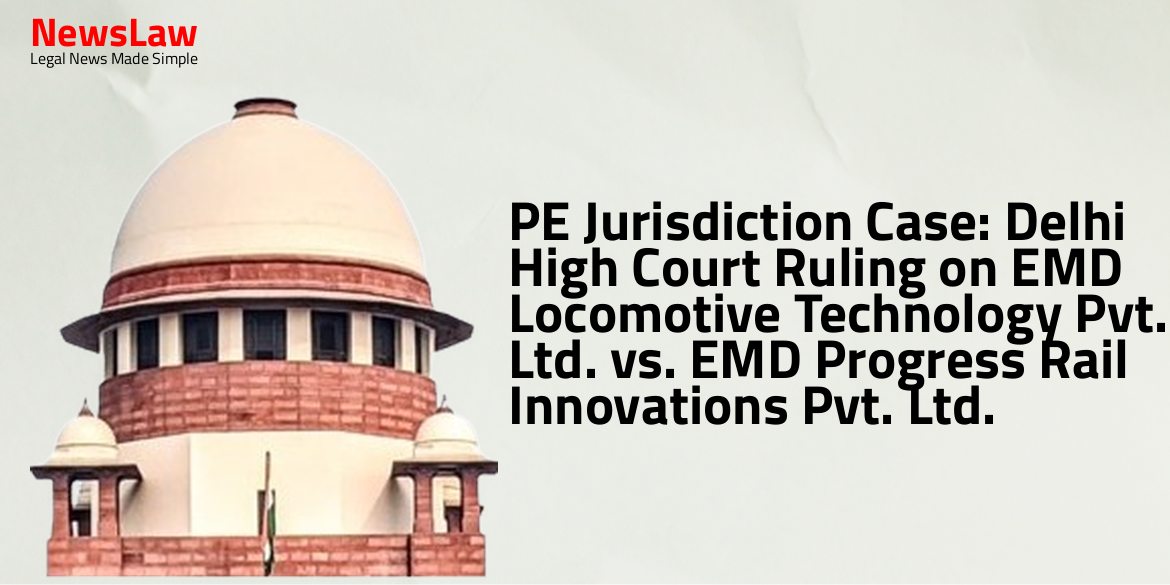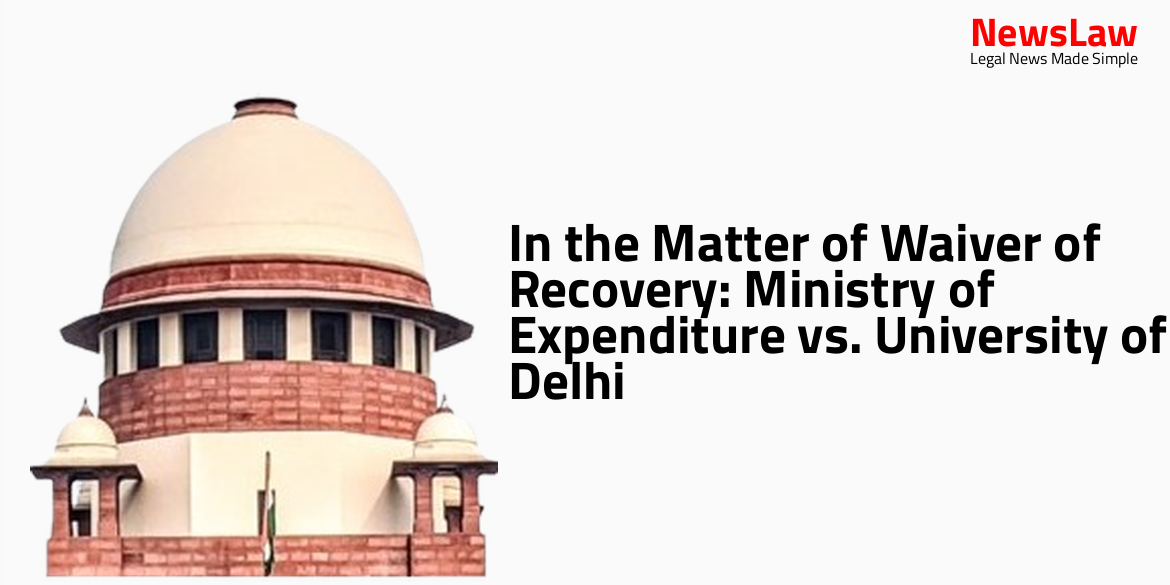Delhi High Court recently addressed the PE jurisdiction case between EMD Locomotive Technology Pvt. Ltd. and EMD Progress Rail Innovations Pvt. Ltd. The court’s ruling has significant implications in the realm of tax law and international transactions. Stay informed about the details and key points of this legal dispute.
Facts
- The petitioner, a foreign company registered under the laws of Delaware, USA, is part of the Caterpillar Group.
- Its key international transaction is providing technical support services.
- The petitioner’s Indian subsidiary, Progress Rail Innovations Private Limited, has been regularly assessed in Delhi and subjected to transfer pricing assessments.
- The first respondent initiated penalty proceedings under Section 271F for failure to submit income tax returns.
- The petitioner contested the jurisdiction of the first respondent and submitted responses and documents in protest.
- A survey report alleged a Fixed Place PE/Service PE/DAPE for the petitioner in India.
- The TP report described the functions and transactions of the petitioner and its AE.
- The first respondent proposed reassessment under Sections 147/148 based on findings from a report.
- The petitioner asserted it did not earn taxable income in India and questioned the jurisdiction of the first respondent.
- The Court granted stay on further proceedings until disposal of the writ petitions.
Issue
- The fundamental question to be answered is whether a PE could be said to have come into existence within the territorial area where EMD Locomotive Technology Pvt. Ltd. is empowered to exercise powers conferred by the Act.
- Examination is required to determine if the Section 148 power was justifiably invoked by EMD Locomotive Technology Pvt. Ltd. Noida.
- The issue involves assessing the risk and responsibility in the delivery of goods in relation to both EMD Locomotive Technology Pvt. Ltd. Noida and Electromotive Diesel Inc. USA.
Arguments
- Learned senior counsel argued that the Noida premises cannot be considered a virtual projection of the holding company.
- The transactions between entities were conducted at arm’s length and assessed in transfer pricing studies.
- The services performed by the Indian subsidiary were similar to those in a Supreme Court case, thus invoking Sections 147/148 of the Act was illegal.
- No prima facie view was formed or reasons recorded in the impugned notices for income escape assessment charges.
- The Supreme Court judgment in Formula One World Championship vs CIT was relied upon to challenge the notices.
- The first respondent did not provide any material indicating the principal function of the Indian subsidiary in contracts with Indian Railways.
- The Indian subsidiary did not play a role in quantity and price issues closely managed by the petitioner.
- The assumption of the Noida factory as a Fixed Place PE was contested by learned counsel.
- The emails indicated foreign expatriates’ visits for business strategies, suggesting a Service PE under the India-USA DTAA.
- PRIPL was argued to act as a DAPE for the petitioner based on contracts concluded on behalf of the petitioner.
- The first respondent did not establish a prima facie view of the petitioner having a PE in India.
- The case of Morgan Stanley & Co. Inc. was cited to support the view that no DAPE existed in India.
- PRIPL was portrayed as a virtual projection of the petitioner, acting on behalf of the latter.
- The Indian subsidiary was argued to not qualify as a PE based on distinct product lines and control aspects.
- The TPO’s examination did not lead to a recognition of the Indian subsidiary as a PE.
- The assertion of the Indian subsidiary as a PE was contested based on lack of conclusive evidence of core business activities being carried out at Noida or Varanasi.
- The contention that even a single visit by petitioner’s employees could constitute a Service PE was put forth.
- Product lines, cost audit reports, and back-office support were highlighted to argue against the Indian subsidiary being viewed as a PE.
- The assertion of the Indian subsidiary as a Service PE was deemed misconceived by learned counsel.
- The migration of PAN for jurisdictional purposes was criticized by the petitioner’s counsel.
- The entire action was rooted in a survey of Indian subsidiary’s premises in Noida and Varanasi.
- Mr. Agarwal cited the decision in E-Funds IT Solutions Inc. to argue that the activities of the Indian subsidiary did not fall within the ambit of the provision regarding enterprise in the India-USA DTAA.
- Mr. Agarwal distinguished the cases of E-Funds IT Solutions Inc. and Samsung Heavy Industries Limited, brought up by Mr. Datar, stating they did not apply to the present case since the Indian subsidiary was involved in core services.
- A survey report formed the basis for the impugned Section 148 notice, indicating PRIPL’s activities as creating a Fixed Place PE/Service PE/DAPE, leading to Mr. Agarwal arguing against interfering with the notices.
- Mr. Datar questioned the fairness of the action taken by the first respondent, highlighting selective extraction of statements by the first respondent in the issue.
- It was argued that activities of SMPL were not solely for TENL as it had other clients as well, indicating that the subsidiary was not solely serving the petitioner.
- Article 5(4) analysis was brought up, where it was suggested that the Indian subsidiary must have the authority and habit of concluding contracts to be considered a PE.
- The decisions of the Supreme Court in E-Funds IT Solutions Inc. and Samsung Heavy Industries Limited were discussed to challenge the formation of opinion by the first respondent.
- A comparative chart was presented by Mr. Datar based on judgments, including Union of India vs UAE Exchange Centre, indicating similar factual scenarios to the present case.
- The importance of Article 5(6) in the India-USA DTAA was emphasized to argue against the premise of the reassessment being conducted.
- Passages from a work on Permanent Establishment were referenced to provide historical context to the discussion on subsidiary PE principles.
- Mentions were made of a definition of ‘wholly’ and ‘almost wholly’ in the context of income distribution from US Co., contrasting it with the findings of the AO in the case at hand.
- The potential jurisdictional issue regarding the appropriate Assessing Officer for reassessment proceedings in Delhi was brought up by Mr. Datar.
Analysis
- The term “permanent establishment” is defined to include various types of physical locations where business activities are conducted.
- Certain activities and locations are specifically mentioned as constituting a permanent establishment, such as a place of management, branch, office, factory, warehouse, store, etc.
- There are exceptions to what constitutes a permanent establishment, such as using facilities for storage or occasional delivery, maintaining a stock of goods for certain purposes, or for specific auxiliary activities.
- If a person is acting on behalf of an enterprise in a Contracting State, that enterprise may be deemed to have a permanent establishment in that State under certain conditions.
- Business conducted through agents of independent status may not automatically create a permanent establishment for the enterprise.
- The fact that one company from a Contracting State controls or is controlled by a company in another Contracting State does not, by itself, establish a permanent establishment for either company.
- The concept of ‘permanent establishment’ postulates a substantial element of presence of a foreign enterprise in another country.
- Outsourcing services to India does not establish a fixed place permanent establishment under Article 5 of the treaty.
- Presence must meet the test of an enduring and permanent nature, in addition to being substantial.
- A fixed place PE involves functions of a preparatory or auxiliary character.
- The test laid down by the Andhra Pradesh High Court in the Visakhapatnam Port Trust case is considered valid.
- The principles governing Fixed Place PE were also discussed in the E-Funds IT Solution Inc. case.
- The concept of PE under international tax law must have a uniform international meaning.
- The assumption of jurisdiction cannot be sustained.
- The opinion on the question of PE would not sustain even on a prima facie basis.
- The Court needed to conclude that the decision on the question of PE was correctly decided or at least a tenable view.
- If the PE question had been answered in favor of the petitioner, Respondent No 1 would have no authority to proceed.
- The Court found itself unable to sustain the opinion as formed by Respondent No 1.
- The view expressed by Respondent No 1 in the impugned proceedings cannot be considered tentative or open to debate.
- The foundation of the impugned action is arbitrary and unsustainable.
- Therefore, the impugned reassessment proceedings would be liable to be quashed.
Decision
- The transfer of the PAN of the petitioner was solely for facilitating the first respondent in conducting the reassessment.
- The jurisdiction of the PAN of the petitioner was transferred from the fourth to the first respondent, but this transfer is now quashed.
- The PAN mapping will revert to the jurisdictional AO of the petitioner, which is the fourth respondent in some cases and the fifth respondent in other cases.
- All rights and contentions of parties in this regard are kept open.
- The quashed notices issued under Section 148 on various dates are annulled.
- The order will not prejudice the respondents from independently examining whether the office of the petitioner in Delhi constitutes a Permanent Establishment (PE).
Case Title: PROGRESS RAIL LOCOMOTIVE INC. (FORMERLY ELECTRO MOTIVE DIESEL INC.), Vs. DEPUTY COMMISSIONER OF INCOME-TAX (INTERNATIONAL TAXATION), CIRCLE – NOIDA & ORS. (2024:DHC:4331-DB)
Case Number: W.P.(C)-12409/2019



